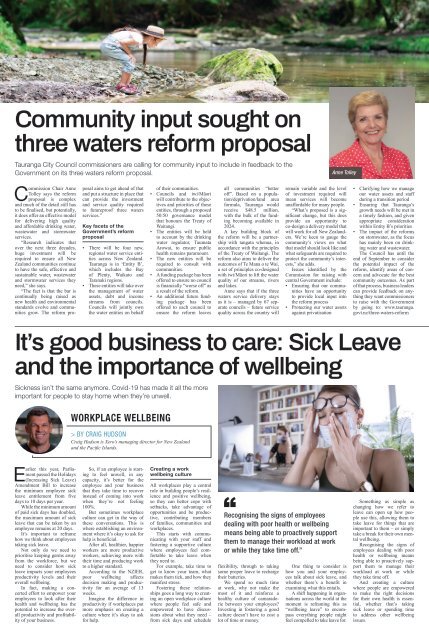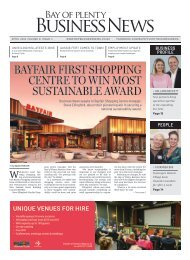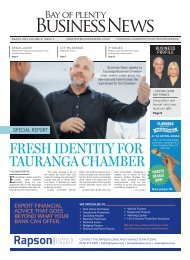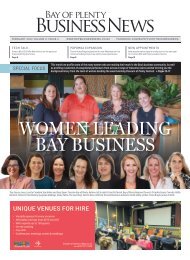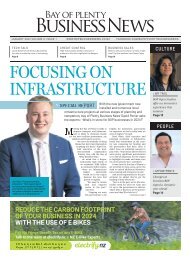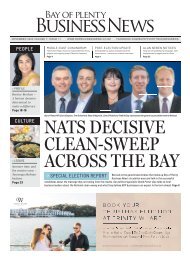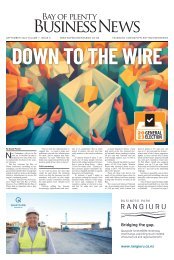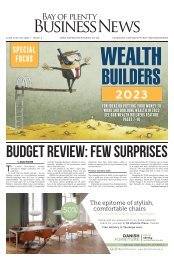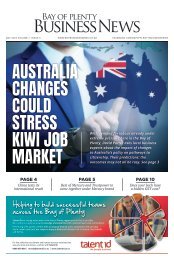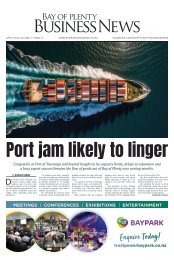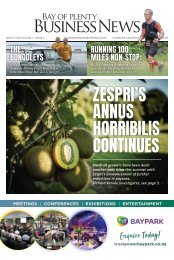September/October 2021 - Bay of Plenty Business News
From mid-2016 Bay of Plenty businesses have a new voice, Bay of Plenty Business News. This new publication reflects the region’s growth and importance as part of the wider central North Island economy.
From mid-2016 Bay of Plenty businesses have a new voice, Bay of Plenty Business News. This new publication reflects the region’s growth and importance as part of the wider central North Island economy.
Create successful ePaper yourself
Turn your PDF publications into a flip-book with our unique Google optimized e-Paper software.
<strong>September</strong>/<strong>October</strong> <strong>2021</strong> BAY OF PLENTY BUSINESS NEWS 17<br />
Community input sought on<br />
three waters reform proposal<br />
Tauranga City Council commissioners are calling for community input to include in feedback to the<br />
Government on its three waters reform proposal.<br />
Anne Tolley<br />
Commission Chair Anne<br />
Tolley says the reform<br />
proposal is complex<br />
and much <strong>of</strong> the detail still has<br />
to be finalised, but potentially,<br />
it does <strong>of</strong>fer an effective model<br />
for delivering high quality<br />
and affordable drinking water,<br />
wastewater and stormwater<br />
services.<br />
“Research indicates that<br />
over the next three decades,<br />
huge investment will be<br />
required to ensure all New<br />
Zealand communities continue<br />
to have the safe, effective and<br />
sustainable water, wastewater<br />
and stormwater services they<br />
need,” she says.<br />
“The fact is that the bar is<br />
continually being raised as<br />
new health and environmental<br />
standards evolve and communities<br />
grow. The reform proposal<br />
aims to get ahead <strong>of</strong> that<br />
and put a structure in place that<br />
can provide the investment<br />
and service quality required<br />
to futurepro<strong>of</strong> three waters<br />
services.”<br />
Key facets <strong>of</strong> the<br />
Government’s reform<br />
proposal<br />
• There will be four new,<br />
regional water service entities<br />
across New Zealand.<br />
Tauranga is in ‘Entity B’,<br />
which includes the <strong>Bay</strong><br />
<strong>of</strong> <strong>Plenty</strong>, Waikato and<br />
Taranaki regions.<br />
• These entities will take over<br />
the management <strong>of</strong> water<br />
assets, debt and income<br />
streams from councils.<br />
Councils will jointly own<br />
the water entities on behalf<br />
<strong>of</strong> their communities.<br />
• Councils and iwi/Māori<br />
will contribute to the objectives<br />
and priorities <strong>of</strong> these<br />
entities, through a proposed<br />
50:50 governance model<br />
that honours the Treaty <strong>of</strong><br />
Waitangi.<br />
• The entities will be held<br />
to account by the drinking<br />
water regulator, Taumata<br />
Arowai, to ensure public<br />
health remains paramount.<br />
• The new entities will be<br />
required to consult with<br />
communities.<br />
• A funding package has been<br />
<strong>of</strong>fered to ensure no council<br />
is financially “worse <strong>of</strong>f” as<br />
a result <strong>of</strong> the reform.<br />
• An additional future funding<br />
package has been<br />
<strong>of</strong>fered to each council to<br />
ensure the reform leaves<br />
all communities “better<br />
<strong>of</strong>f”. Based on a population/deprivation/land<br />
area<br />
formula, Tauranga would<br />
receive $48.5 million,<br />
with the bulk <strong>of</strong> the funding<br />
becoming available in<br />
2024.<br />
A key building block <strong>of</strong><br />
the reform will be a partnership<br />
with tangata whenua, in<br />
accordance with the principles<br />
<strong>of</strong> the Treaty <strong>of</strong> Waitangi. The<br />
reform also aims to deliver the<br />
outcomes <strong>of</strong> Te Mana o te Wai,<br />
a set <strong>of</strong> principles co-designed<br />
with iwi/Māori to lift the water<br />
quality <strong>of</strong> our streams, rivers<br />
and lakes.<br />
Anne says that if the three<br />
waters service delivery stays<br />
as it is – managed by 67 separate<br />
councils – future service<br />
quality across the country will<br />
remain variable and the level<br />
<strong>of</strong> investment required will<br />
mean services will become<br />
unaffordable for many people.<br />
“What’s proposed is a significant<br />
change, but this does<br />
provide an opportunity to<br />
co-design a delivery model that<br />
will work for all New Zealanders.<br />
We’re keen to gauge the<br />
community’s views on what<br />
that model should look like and<br />
what safeguards are required to<br />
protect the community’s interests,”<br />
she adds.<br />
Issues identified by the<br />
Commission for raising with<br />
central Government include:<br />
• Ensuring that our communities<br />
have an opportunity<br />
to provide local input into<br />
the reform process<br />
• Protecting our water assets<br />
against privatisation<br />
• Clarifying how we manage<br />
our water assets and staff<br />
during a transition period<br />
• Ensuring that Tauranga’s<br />
growth needs will be met in<br />
a timely fashion, and given<br />
appropriate consideration<br />
within Entity B’s priorities<br />
• The impact <strong>of</strong> the reforms<br />
on stormwater, as the focus<br />
has mainly been on drinking<br />
water and wastewater.<br />
The Council has until the<br />
end <strong>of</strong> <strong>September</strong> to consider<br />
the potential impact <strong>of</strong> the<br />
reform, identify areas <strong>of</strong> concern<br />
and advocate for the best<br />
community outcomes. As part<br />
<strong>of</strong> that process, business leaders<br />
can provide feedback on anything<br />
they want commissioners<br />
to raise with the Government<br />
by going to: www.tauranga.<br />
govt.nz/three-waters-reform<br />
It’s good business to care: Sick Leave<br />
and the importance <strong>of</strong> wellbeing<br />
Sickness isn’t the same anymore. Covid-19 has made it all the more<br />
important for people to stay home when they’re unwell.<br />
WORKPLACE WELLBEING<br />
> BY CRAIG HUDSON<br />
Craig Hudson is Xero’s managing director for New Zealand<br />
and the Pacific Islands.<br />
Earlier this year, Parliament<br />
passed the Holidays<br />
(Increasing Sick Leave)<br />
Amendment Bill to increase<br />
the minimum employee sick<br />
leave entitlement from five<br />
days to 10 days per year.<br />
While the minimum amount<br />
<strong>of</strong> paid sick days has doubled,<br />
the maximum amount <strong>of</strong> sick<br />
leave that can be taken by an<br />
employee remains at 20 days.<br />
It’s important to reframe<br />
how we think about employees<br />
taking sick leave.<br />
Not only do we need to<br />
prioritise keeping germs away<br />
from the workforce, but we<br />
need to consider how sick<br />
leave impacts your employees<br />
productivity levels and their<br />
overall wellbeing.<br />
In fact, making a concerted<br />
effort to empower your<br />
employees to look after their<br />
health and wellbeing has the<br />
potential to increase the overall<br />
productivity and pr<strong>of</strong>itability<br />
<strong>of</strong> your business.<br />
So, if an employee is starting<br />
to feel unwell, in any<br />
capacity, it’s better for the<br />
employee and your business<br />
that they take time to recover<br />
instead <strong>of</strong> coming into work<br />
when they’re not feeling<br />
100%.<br />
But sometimes workplace<br />
culture can get in the way <strong>of</strong><br />
these conversations. This is<br />
where establishing an environment<br />
where it’s okay to ask for<br />
help is beneficial.<br />
After all, healthier, happier<br />
workers are more productive<br />
workers, achieving more with<br />
their time and producing work<br />
to a higher standard.<br />
According to the NZIER,<br />
poor wellbeing affects<br />
decision making and productivity<br />
for an average <strong>of</strong> 13<br />
weeks.<br />
Imagine the difference in<br />
productivity if workplaces put<br />
more emphasis on creating a<br />
culture where it’s okay to ask<br />
for help.<br />
Creating a work<br />
wellbeing culture<br />
All workplaces play a central<br />
role in building people’s resilience<br />
and positive wellbeing,<br />
so they can better cope with<br />
setbacks, take advantage <strong>of</strong><br />
opportunities and be productive,<br />
contributing members<br />
<strong>of</strong> families, communities and<br />
workplaces.<br />
This starts with communicating<br />
with your staff and<br />
fostering a supportive culture<br />
where employees feel comfortable<br />
to take leave when<br />
they need to.<br />
For example, take time to<br />
get to know your team, what<br />
makes them tick, and how they<br />
manifest stress.<br />
Fostering these relationships<br />
goes a long way to creating<br />
an open workplace culture<br />
where people feel safe and<br />
empowered to have discussions<br />
about what they need –<br />
from sick days and schedule<br />
Recognising the signs <strong>of</strong> employees<br />
dealing with poor health or wellbeing<br />
means being able to proactively support<br />
them to manage their workload at work<br />
or while they take time <strong>of</strong>f.”<br />
flexibility, through to taking<br />
some proper leave to recharge<br />
their batteries.<br />
We spend so much time<br />
at work, why not make the<br />
most <strong>of</strong> it and reinforce a<br />
healthy culture <strong>of</strong> camaraderie<br />
between your employees?<br />
Investing in fostering a good<br />
culture doesn’t have to cost a<br />
lot <strong>of</strong> time or money.<br />
One thing to consider is<br />
how you and your employees<br />
talk about sick leave, and<br />
whether there’s a benefit in<br />
examining what this entails.<br />
A shift happening in organisations<br />
across the world at the<br />
moment is reframing this as<br />
“wellbeing leave” to encompass<br />
everything people might<br />
feel compelled to take leave for.<br />
Something as simple as<br />
changing how we refer to<br />
leave can open up how people<br />
use this, allowing them to<br />
take leave for things that are<br />
important to them – or simply<br />
take a break for their own mental<br />
wellbeing.<br />
Recognising the signs <strong>of</strong><br />
employees dealing with poor<br />
health or wellbeing means<br />
being able to proactively support<br />
them to manage their<br />
workload at work or while<br />
they take time <strong>of</strong>f.<br />
And creating a culture<br />
where people are empowered<br />
to make the right decisions<br />
for their own health is essential,<br />
whether that’s taking<br />
sick leave or spending time<br />
to address other wellbeing<br />
issues.


